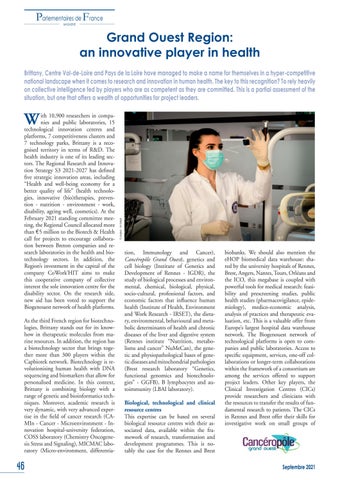arlementaires de
rance
MAGAZINE
Grand Ouest Region: an innovative player in health Brittany, Centre Val-de-Loire and Pays de la Loire have managed to make a name for themselves in a hyper-competitive national landscape when it comes to research and innovation in human health. The key to this recognition? To rely heavily on collective intelligence fed by players who are as competent as they are committed. This is a partial assessment of the situation, but one that offers a wealth of opportunities for project leaders. ith 10,900 researchers in companies and public laboratories, 15 technological innovation centres and platforms, 7 competitiveness clusters and 7 technology parks, Brittany is a recognised territory in terms of R&D. The health industry is one of its leading sectors. The Regional Research and Innovation Strategy S3 2021-2027 has defined five strategic innovation areas, including “Health and well-being economy for a better quality of life” (health technologies, innovative (bio)therapies, prevention - nutrition - environment - work, disability, ageing well, cosmetics). At the February 2021 standing committee meeting, the Regional Council allocated more than €5 million to the Biotech & Health call for projects to encourage collaboration between Breton companies and research laboratories in the health and biotechnology sectors. In addition, the Region’s investment in the capital of the company CoWork’HIT aims to make this cooperative company of collective interest the sole innovation centre for the disability sector. On the research side, new aid has been voted to support the Biogenouest network of health platforms. As the third French region for biotechnologies, Brittany stands out for its knowhow in therapeutic molecules from marine resources. In addition, the region has a biotechnology sector that brings together more than 300 players within the Capbiotek network. Biotechnology is revolutionising human health with DNA sequencing and biomarkers that allow for personalised medicine. In this context, Brittany is combining biology with a range of genetic and bioinformatics techniques. Moreover, academic research is very dynamic, with very advanced expertise in the field of cancer research (CAMIn - Cancer - Microenvironment - Innovation hospital-university federation, COSS laboratory (Chemistry Oncogenesis Stress and Signaling), MICMAC laboratory (Micro-environment, differentia-
46
© Unsplash – Ani Kolleshi
W
tion, Immunology and Cancer), Cancéropôle Grand Ouest), genetics and cell biology (Institute of Genetics and Development of Rennes - IGDR), the study of biological processes and environmental, chemical, biological, physical, socio-cultural, professional factors, and economic factors that influence human health (Institute of Health, Environment and Work Research - IRSET), the dietary, environmental, behavioural and metabolic determinants of health and chronic diseases of the liver and digestive system (Rennes institute “Nutrition, metabolisms and cancer” NuMeCan), the genetic and physiopathological bases of genetic diseases and mitochondrial pathologies (Brest research laboratory “Genetics, functional genomics and biotechnologies” - GGFB), B lymphocytes and autoimmunity (LBAI laboratory). Biological, technological and clinical resource centres This expertise can be based on several biological resource centres with their associated data, available within the framework of research, transformation and development programmes. This is notably the case for the Rennes and Brest
biobanks. We should also mention the eHOP biomedical data warehouse: shared by the university hospitals of Rennes, Brest, Angers, Nantes, Tours, Orléans and the ICO, this megabase is coupled with powerful tools for medical research: feasibility and prescreening studies, public health studies (pharmacovigilance, epidemiology), medico-economic analysis, analysis of practices and therapeutic evaluation, etc. This is a valuable offer from Europe’s largest hospital data warehouse network. The Biogenouest network of technological platforms is open to companies and public laboratories. Access to specific equipment, services, one-off collaborations or longer-term collaborations within the framework of a consortium are among the services offered to support project leaders. Other key players, the Clinical Investigation Centres (CICs) provide researchers and clinicians with the resources to transfer the results of fundamental research to patients. The CICs in Rennes and Brest offer their skills for investigative work on small groups of
Septembre 2021
